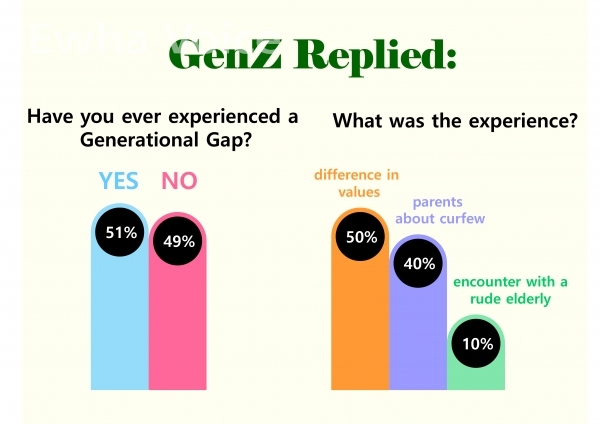
Today’s media often say that individualism has become stronger than ever before following the pandemic, and our world is now shifting to what is called a “nano society.”
Nano society is one of the terms representing 2022, according to the book, “TREND KOREA 2022.” It refers to a society in which individuals are dispersed in small units without forming a larger community bond. As these groups are divided, conflicts have begun to escalate between them.
However, this may not be the case. Seeking to figure out whether the social atmosphere depicted in the media is true, Ewha Voice met various individuals and listened to their opinions on individualism, generational conflict, and gender conflict.
When it came to individualism, opinions varied. Lee So-yeon, an international student studying in China, agreed that our society has become desolate since COVID-19.
“We are living in an environment where individualism is inevitable,” Lee said. “Many international students like me are still taking classes online, spending most of the time at home.”
However, Lee also stressed that she is not only living an individualistic life. She is satisfied with meeting friends online through drinking parties and study sessions via Zoom, experiencing moments of grouping in her daily life.
Park Min-joo, a freshman majoring in media and communication at Korea University, believes that our society has begun to resemble what the media has been reporting.
“I have had more opportunities to socialize and have relationships with people,” Park said. “Thinking about what I had felt, I came to the conclusion that it is due to the nature of the media to inflate and emphasize small problems and the tendency of people to follow the majority.”
Along with this growing tendency toward individualism, the media has pointed to a growing gap between age groups. Differences in political ideology, the distribution of opportunities, and accessibility to new technologies have reportedly given rise to serious generational conflict.
According to the survey Ewha Voice conducted from April 27 to May 10, among 70 people, 59 percent of generation Z (Gen Z) respondents have experienced generational conflict. Gen Z consists of people aged 10 to 25. However, responses showed that the reasons were not as motivated as the media portrays, rather having more to do with everyday life experiences.
According to the survey, 40 percent of the respondents cited conflicts with their parents regarding curfew. A further 10 percent experienced elderly customers talking down to them in the context of part-time jobs. The remaining 50 percent consists of conflicts with older generations regarding values about dating, attire, and future jobs.
Some replied that they have been criticized by the elderly about their clothing. “Living abroad for a long time, I am more comfortable wearing bra tops and short clothes, especially in the summer,” said a respondent who preferred to remain anonymous. “An old lady once told me that kids like me are lowering the birth rate.”
Meanwhile, a respondent who has not experienced a generational gap remarked that the older generations seem to be well aware of the “children these days” as the media heaps attention on the MZ generation.
A growing gap between gender is another major issue that has been frequently reported by the media.
Lee Eon-ho, a freshman at Hanyang University School of Architecture, agreed with the media that COVID-19 has had an impact on gender conflict. He mentioned debates in online space going beyond appropriate levels, causing extreme conflict.
Lee also shared his thoughts on why the media continuously published issues related to gender conflict.
“Gender conflict is more like a ‘protest’ for women to gain equality,” Lee said. “Men are still dominant in modern society, and it is the same for mainstream media. The media generalizes gender conflict to resist their loss of power due to continuous protest.”
Rhomyung Song, an undergraduate studying mathematics at Seoul National University, had similar thoughts.
“Gender issues are a great source of income; hence, provocative articles are published,” Song said. “It forms a sort of propaganda where most people are ignorant of the issue, with those from each end battling for attention.”
Song emphasized the momentariness of gender conflict as most conflicts are no longer issues within a few days.
“Although the pandemic and gender issues do not seem to have an exceptionally close relationship, COVID-19 did individualize people and weaken single-sex communities,” Song said. “Conflicts are still going on somewhere, without people interested in resolving them.”
Taken all this together, we may be living in a hybrid society where various forms of life and experience coexist. Although what the media reports may be true to some extent, the details in everyday life may differ. Therefore, accepting the media subjectively with thorough observation and reflection on experience is required.

